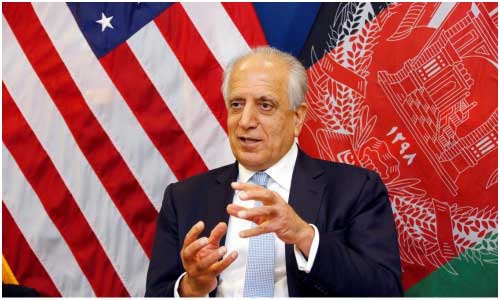DOHA - American peace envoy Zalmay Khalilzad said efforts are being made to establish an international support group for the Afghan peace process and that hopefully, this group will be able to encourage Iran to support the peace process.
Speaking to Andrew Wilder, vice president of the Asia center of the US Institute of Peace, during a Pearson Institute webinar, Khalilzad said the US is involved in discussions with the Afghans, neighboring countries and other countries “to establish an international support group for peace in Afghanistan because there is an internal dimension to the conflict in Afghanistan and [also] a regional and international dimension to it.”
“I hope we will have the announcement of an international support group that could meet relatively soon,” he said.
Khalilzad stated that many countries in the region realize the benefits of having a peaceful Afghanistan – especially in terms of investment and trade, which includes Pakistan that “sees an opening to Central Asia” through Afghanistan.
In line with this, the US is seeking to forge an agreement between Afghanistan and Pakistan to ensure neither country will provide havens to terrorist groups.
With regards to Afghanistan’s western neighbor, Iran, he said “there are two Irans; the foreign ministry Iran which says positive things and makes statements that could be construed as supporting the peace process,” but then there is the other Iran that would like to “keep the US entangled in a war.”
Iran “appears to want the war to go on rather than for the peace process to succeed,” he said adding that “we would like Iran … to participate in the regional efforts in support of peace.”
Referring to the proposed support group, he said such a body would hopefully be able to encourage Iran “to be supportive of peace efforts”.
“The current situation is a mixed one,” he noted.
On the current high levels of violence in the country, Khalilzad said there had been significant fighting in the “countryside” and “we are discussing with both sides, with the Taliban, to reduce the attacks.”
He stated that both the Afghan side and the Taliban are involved in the violence but said it is not only the Taliban involved in attacks but other groups are also playing a part.
One group was mentioned, which he said was ISIS but he added that “there are also neighbors that are not being entirely helpful.” However, he did not name the country.
Efforts were meanwhile being made to reduce attacks as continued high levels of violence could undermine the people’s faith in the peace process, he said.
On questions raised over the Taliban’s commitment to the negotiations and peace process and how to counter the perception that the Taliban thinks it has already won, Khalilzad said the Taliban appears serious about the process and has sent a high-ranking team, mostly from its leadership, to negotiate.
“They have a strategy, a plan on how to negotiate,” he said adding that there were some differences of opinions within the Taliban’s team with regard to what type of settlement should be reached.
He stated that the US has however reached an agreement with the Afghan government on an end-state to the negotiations and are working” together, to cooperate, to get to that end-state during the negotiations.”
Many countries, including the United Nations Security Council, have said the return of an Islamic Emirate is not acceptable, many neighboring countries and allies are saying the same, he said.
The Taliban however would like to be accepted as a legitimate player, he noted adding that this could not happen if they refuse to accept a “reduction in violence if they don’t observe basic human rights.”
He said the Taliban has been told: “what they decide with other Afghans will determine what we [the US] do in relation to them.”
Khalilzad stated the peace process has its challenges – pointing out it has been 40 years of war and there has been “a lot of mistrust among Afghans,” and distrust between the US and the Taliban – which are all understandable, he said.
Questioned on what an actual end-state entails, Khalilzad said the US has stated it wants to see a united, sovereign Afghanistan that is at peace with itself and one that has a representative government that is broadly acceptable to the Afghan people – also that the gains of the past 19 years are preserved. (ATN)
Home » Afghanistan » Khalilzad Claims Iran Not Entirely Supportive of Peace Process
Khalilzad Claims Iran Not Entirely Supportive of Peace Process

